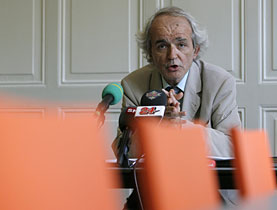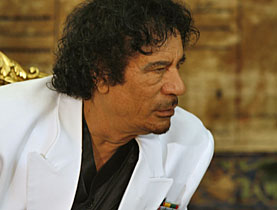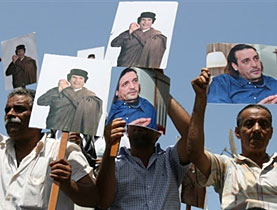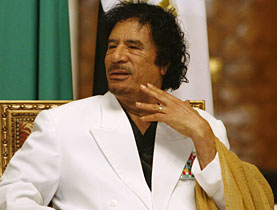Tensions with Libya ease but talks continue

The foreign ministry says bilateral talks are continuing on a diplomatic level to end a row with Libya.
On Tuesday two Swiss citizens jailed for alleged immigration violations were released on bail. But no Swiss nationals are allowed to leave Libya.
Foreign ministry spokesman Jean-Philippe Jeannerat said moves were underway to restore normal relations between the two countries. Tensions began when one of the sons of Libyan leader Moammar Gaddafi was temporarily arrested in Geneva earlier in July.
“Work done in the past few days is beginning to yield results,” said Jeannerat at a media briefing on Wednesday.
“We are in talks with Libyan diplomats. Both countries agree that there are still important problems to be resolved,” he added.
Jeannerat said Swiss companies paid about SFr9,000 ($8,582) in bail each to secure the release of their employees.
The two men were told they could move freely within Libya, but are not allowed to leave the country. Both of them are under consular protection. The foreign ministry refused to give further details.
The Swiss embassy in Tripoli is also in close contact with the other about 40 Swiss expatriates in the country. There are no reports of harassment.
However, economic sanctions against Swiss companies in Libya appear to remain in place. Several firms were ordered to close and the number of flights of the airline, Swiss, was reduced.
However, it is not clear whether a boycott of crude oil deliveries was imposed.
“We are trying to evaluate the situation of the Swiss firms in Libya,” said Jeannerat.
No comment
He refused to comment on reports about possible involvement of third parties in efforts to de-escalate the crisis between Libya and Switzerland.
“It is not the right moment to give any information about possible offers for help. We are in a bilateral phase and Libya has agreed to this procedure,” said the foreign ministry.
Algeria, Egypt and France have allegedly intervened at the highest levels. Last week several countries, including France and Italy, announced they were willing to act as mediators for Switzerland.
“We are grateful that certain personalities, organisations and states offered their assistance if it were necessary,” said spokesman Jeannerat, but he refused to elaborate.
He did not comment on a report that a Swiss delegation had travelled to Libya for further talks.
Saving face
Kurt Spillmann, former head of the Center for Security Studies in Zurich, commended Swiss diplomats for their approach to solving the crisis with Libya.
He says Switzerland might have met some of the demands made by Gaddafi and allowed the Libyan leader to save face.
“The steps taken are not publically known but it amounted to a cooling off. I think this is the beginning of the end of the crisis,” Spillmann told World Radio Switzerland.
Libya reportedly asked for an apology for the temporary arrest of Hannibal Gaddafi and his wife in Geneva two weeks ago on charges of ill-treatment of their domestic employees.
Demonstrators in Libya also called for an end to the legal proceedings against the couple in Geneva.
They deny the allegations and were released on SFr500,000 bail and have since left Switzerland.
The foreign ministry said the justice authorities in Geneva were independent as part of the separation of powers under the Swiss constitution.
swissinfo, Urs Geiser
Libya is one of Switzerland’s five key export markets on the African continent. It is also Switzerland’s main supplier of crude oil.
There are about 40 Swiss expatriates in Libya, most of them have dual nationality.
Switzerland recognised the new state immediately after the Declaration of Independence in 1951. An embassy was opened in Tripoli in 1968.
In a diplomatic spat in 1997 Tripoli banned Swiss citizens from entering Libya to protest against Switzerland’s refusal to grant a student visa to a son of Colonel Gaddafi.
In return the Swiss authorities tightened entry regulations for Libyan citizens. The conflict was solved in April 1998.
Political contacts between the two countries also returned to normal after the UN-imposed sanctions were lifted in 2003.
Hannibal Gaddafi and his wife were charged by a magistrate with inflicting physical injuries and using threats and force against two of their staff.
The two domestic employees who lodged a formal complaint said they were beaten and Gaddafi’s wife poured boiling water over them.
They have a medical certificate which proves the injuries, but the Gaddafi couple denies the charges.
The Gaddafi family described the arrest of Hannibal as an act of anti-Arab racism.
Relatives of one of the servants were arrested in Libya, according to Swiss lawyer François Membrez.
He also said the complaint against Hannibal would not be withdrawn at least as long as relatives are still held by the Libyans.

In compliance with the JTI standards
More: SWI swissinfo.ch certified by the Journalism Trust Initiative





You can find an overview of ongoing debates with our journalists here. Please join us!
If you want to start a conversation about a topic raised in this article or want to report factual errors, email us at english@swissinfo.ch.